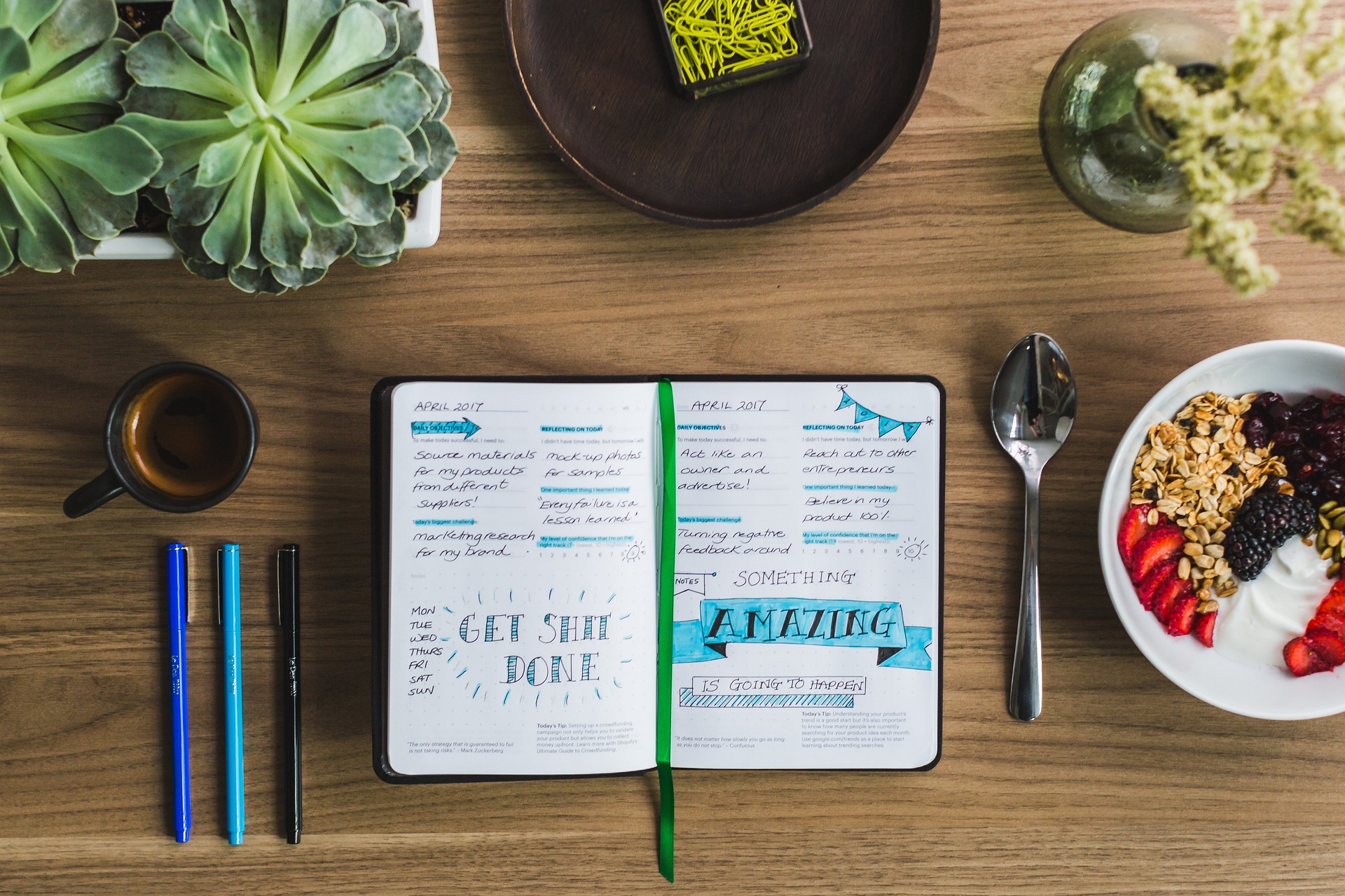Do you keep a food journal? Journaling is not a new concept. As an adolescent or teen, you may have kept a diary or journal locked in your underwear drawer or under your mattress where you gushed about the cute guy in science class or who you wanted to go to the prom with.
Journaling is a powerful way to get your thoughts and feelings out on paper. Doing so can help you navigate challenging times and issues affecting your mental health. Journaling can be a cathartic process. Seeing the words swirling around in your head on paper helps you analyze thoughts more effectively, put them into perspective, and take action to initiate change.
Keeping a food journal isn’t all that much different? Read on to find out more and why should you keep a food journal.
What is a food journal?
Very simply, a food journal is a log or diary of what you eat and drink every day. Instead of writing about what you did that day, you’re writing about what you ate. Food journals don’t have to be that complicated. It can be freeform in a simple notebook or kept electronically on your computer. You can search for and download a variety of templates from the internet. In a world of selfies, you can even snap pictures of your food.
It doesn’t really matter what mechanism you use to keep a food journal, so long as it works for you. However, studies do show that physically writing things out on paper is more effective. It creates a different connection of neural pathways in the brain than would be made if keeping a food journal on a computer.
5 reasons why you should keep a food journal
Keeping a food journal can be a powerful tool in helping you establish healthy eating habits and improve your relationship with food. But keeping a food journal can do much more than that.
Accountability
Keeping a food journal keeps you accountable to yourself. It keeps you honest and present with what you’re eating and drinking every day. Sure, you can always omit something you ate from your journal, but you’ll be more cognizant of the omission when you’re writing it down. Just because you didn’t write it down doesn’t mean you didn’t eat it.
Record thoughts and emotions around food
Have you ever noticed that when you’re stressed you crave foods that are fatty and carb-laden? That’s a real biologic response, not a lack of self-control. By keeping a food journal where you capture your thoughts and emotions before and after an eating binge, you can begin to identify triggers. From there, you can develop coping mechanisms and strategies to head off the catastrophe of a pint of ice cream and a bag of Doritos.
To discover potential food sensitivities and allergies
Does your mouth itch or your body break out in hives after eating certain foods where it never did that before? Was it the nachos with refried beans that caused your intense bloating and severe gastric distress? Keeping a food journal can be just the thing that helps pinpoint what those offending food may have been.
Understand portion control
Portion control is one of the most simple and effective tools to use to manage your weight. When you understand how much a portion is and how much you should be eating, you can better see where you can make some changes. For example, when you begin to notice that 2 scoops of macaroni and cheese per meal are making your clothes a little snugger, try knocking that down to 1 scoop and see if it makes a difference.
Aid in weight loss
In total, the more aware of what you are eating and why the more data you have to make informed choices on what you need to change or cut back on to better manage your weight.
It’s really no different than tracking your spending. When you are diligent in tracking how much money you spend, you can see exactly where all of your money is going. Similarly, when you keep a food journal, you can see where you are “spending” all of your calories.
What should you write in a food journal?
Food journals can be as detailed as you’d like and should have several elements. The more your put into it, the more effective it can be to help you understand eating habits, patterns, and trends which can provide data to help you make better food choices.
Remember, this is just data to be looked at objectively. It’s not a marker of judgment or critique.
What you eat and how much
At a minimum, your food journal should contain what you eat and drink, and how much. The level of detail you provide is up to you. Ultimately the more detail you provide, the better. The reason for this is recording how much you eat gives real quantitative data about your portion sizes.
So, for example, breakfast can be captured as:
Scrambled eggs and toast, cup of coffee, OR
1 scrambled egg and 1 slice of toast, 1 cup of coffee with cream and sugar, OR
1 large, scrambled egg, 10 grams of toast, 4 grams of butter, 8oz coffee, 60ml cream, 1 tsp sugar.
The last example is very extreme and obviously requires weighing and measuring your food. This is how those who count macros, or macronutrients keep their food journals.
Tracking what you eat also means the little morsels of food you pick at while you’re cooking or the onsey-twosey fries you snatch off your partner’s plate. All those little calories add up. By capturing them in your food journal, you can
When you eat it
Do you eat the clock? Meaning do you eat breakfast at 7 am and lunch at noon because that’s the time you’re ‘supposed’ to eat? When you keep a food journal, you may notice that you eat even when you’re not hungry, simply because the clock says it’s time for lunch or a mid-morning snack. Paying attention to the timing of your snacks could reveal some interesting trends. This is especially true if you capture your real level of hunger when grabbing that snack.
Who’s with you when eating
There is an undeniable social aspect to eating. Sharing a meal with friends and family is probably one of the things we looked forward to the most as the restrictions of the pandemic faded. It’s also the time we tend to overindulge.
Tracking who you’re with when you eat can pinpoint if you’re eating more or less depending on who you’re with. Armed with that information you can determine what tactics you need to employ if you tend to overeat or mindlessly graze through a meal at a social gathering.
How you’re feeling before, during, and after you’ve eaten
Despite the way it feels, overeating isn’t a spur-of-the-moment decision. The groundwork is laid well beforehand. It may come from regular habits, a series of emotional and stressful events, or automatic thinking.
By keeping a food journal, you can capture how you feel before during and after you’ve had a binge eating event. In doing so, you can reflect on what transpired that made you reach for food for comfort.
Any physical sensations or reactions (bloating, itching, hives, gastric discomfort)
Food sensitivities and allergies are no joke. They can run the gamut from being annoying to being life-threatening. Your gastrointestinal system is your body’s primary immune defense system. Nearly 80% of your body’s immune cells are found in your gut. In a world of over processed and genetically modified foods that constantly assault your gut microbiome, it’s no surprise that food sensitivities and allergies develop.
When the symptoms occur, they can be easy to dismiss as seasonal allergies or something that just didn’t ‘agree with you.’ If a particular food didn’t agree with you, there’s a good chance you’ve developed a sensitivity to that food, which isn’t unusual. By keeping a food journal and noting any peculiar reactions to the food you eat you can eliminate them from your diet to see if your symptoms improve or disappear. This is exactly what an elimination diet does and keeping a food journal is a necessary component of an elimination diet. In essence, you become your own science experiment.
Download this FREE Daily Food Journal!
Is keeping a food journal effective?
Keeping a food journal can be a highly effective tool in your toolbox to help you improve your eating habits and aid in weight loss. In one study, those who kept a food journal lost twice as much weight as those who kept no records.
Whether we realize it or not, eating is an emotionally driven event rather than one driven by true physical hunger. We are fortunate to live in a society of abundance where food is readily available. Many of us never experience the true physical hunger that drives our physiological need to eat.
Eating is a highly motivating and reinforced behavior that induces feelings of gratification and pleasure. By keeping a food journal, you become more aware of all the elements that influence when, why and what you eat so you can make appropriate changes that suit your health and well-being.
Final Words
Keeping a food journal looks like it can be a lot of work. Depending on the level of detail you want to capture, that may be true. What is also true is that keeping a food journal is a highly effective tool that can provide a multitude of benefits if you want to improve your eating habits, eat less, or correct your emotional eating behaviors.

